
Growth of exotics climbs along with illegal importation problem
The growth of the exotic pets industry brings with it some problems, including illegal imports which raise health concerns.
National Report — You may be seeing a more diverse crowd on your exam table these days. And, as exotic pets scamper and slither into more U.S. homes, some believe they bring new public-health concerns.
The number of exotic animals available in the United States has increased 75 percent since 1992, according to an October 2008 report co-authored by Dr. Nina Marano, DVM, MPH, and branch chief of the Travelers' Health and Animal Importation branch of the Centers for Disease Control and Prevention (CDC).
The exotic-pet market has grown because of globalization and the Internet, Marano says.
"The consumer who perhaps wants to buy the latest and greatest in terms of an exotic pet can go on the Internet and look at a picture of a cute, furry, little critter and find that very appealing, but not fully understand where that animal is coming from," she says.
Many exotic animals that end up as pets are imported into the United States illegally. That illegal trade is estimated at $6 billion to $10 billion annually worldwide, according to Marano's report, which was published in the journal Pediatrics from the American Academy of Pediatrics, but Marano says the CDC can't quantify the number of animals that are illegally imported each year.
When it comes to smuggling, parrots are the most common species to illegally cross the Mexican border, says Sheila Einsweiler, senior wildlife inspector for the U.S. Fish and Wildlife Service.
"That's still a very definite problem and obviously a concern from both an agricultural standpoint and for personal disease issues," she says.
Legal importation of exotic animals has risks, Einsweiler adds. She cites the 2003 monkey pox outbreak, which started when African rodents were imported into the United States and spread the disease to pet prairie dogs, according to CDC. The rodents were properly declared and didn't violate any federal laws, she says.
"The bigger question is 'What's coming in now in the trade that has the potential to bring in diseases? What are we missing?'" Einsweiler asks.
"Other than birds ... the majority of wildlife that comes in doesn't have to go into quarantine, so they are plucked right out of whatever country and in a very short time are right directly into somebody's hands.
"That's the bigger concern that many of the agencies have been talking about: disease risks with illegal wildlife trade, but also very definitely with the legal wildlife trade."
U.S. Fish and Wildlife Service inspectors at major ports of entry either physically inspect or review the documents of most of the live animals that enter the country, so they are often the first to alert the CDC about animals that can't come into the country because of disease risk, Einsweiler explains.
Veterinarians are usually the first to discover these diseases in the normal course of a work-up, Marano adds.
"An astute clinician recognizing that they have something unusual on their hands, and reporting it through the proper channels, either the state agricultural veterinarian or state public-health veterinarian — that's extremely important."
Veterinarians treating exotics should protect themselves and their staffs by following basic hygienic procedures, she adds. And all should be trained to recognize foreign-animal diseases, which are particularly important to agencies like the U.S. Department of Agriculture.
Ms. Barney is a graduate student at Northwestern University's Medill School of Journalism.
Newsletter
From exam room tips to practice management insights, get trusted veterinary news delivered straight to your inbox—subscribe to dvm360.




